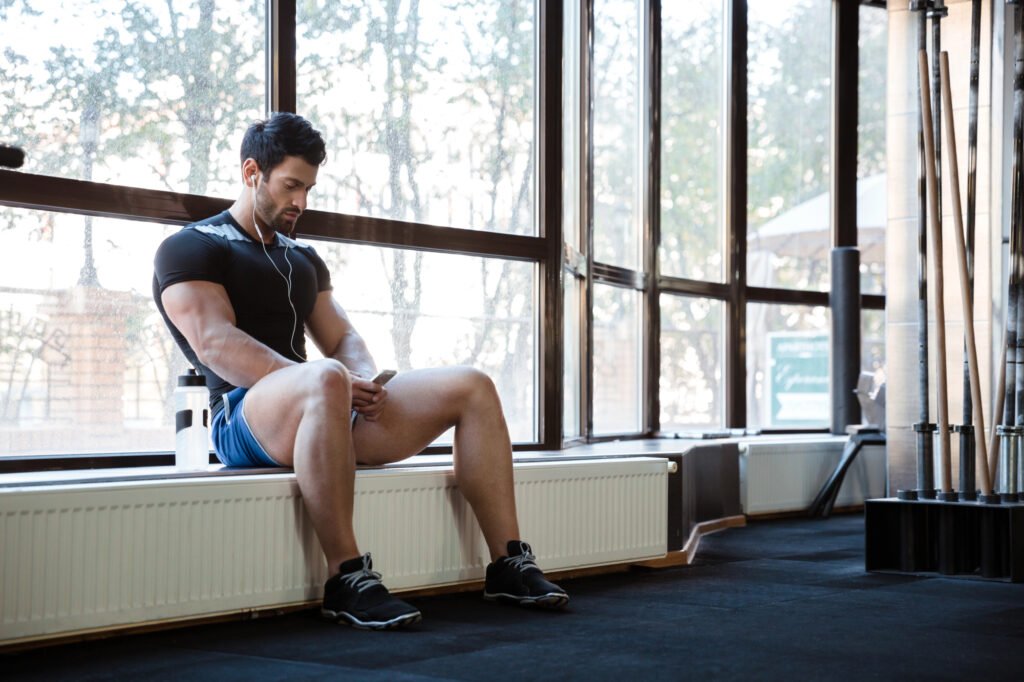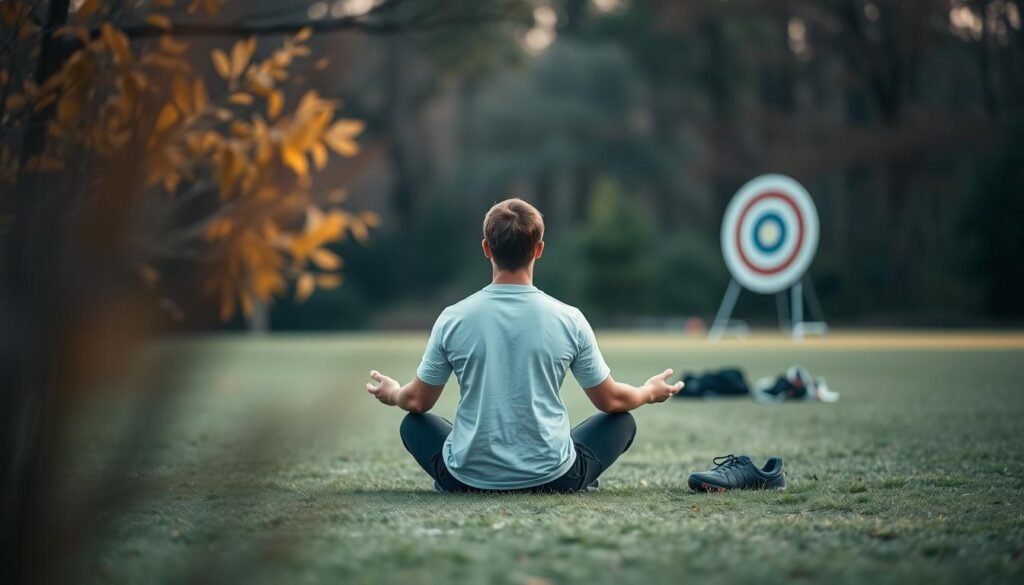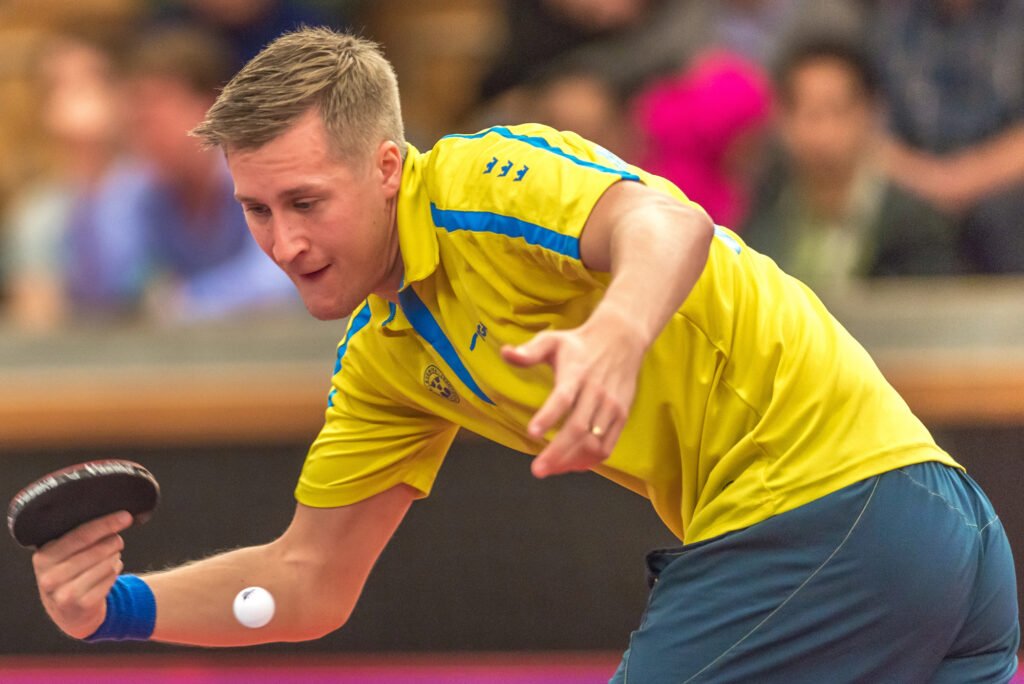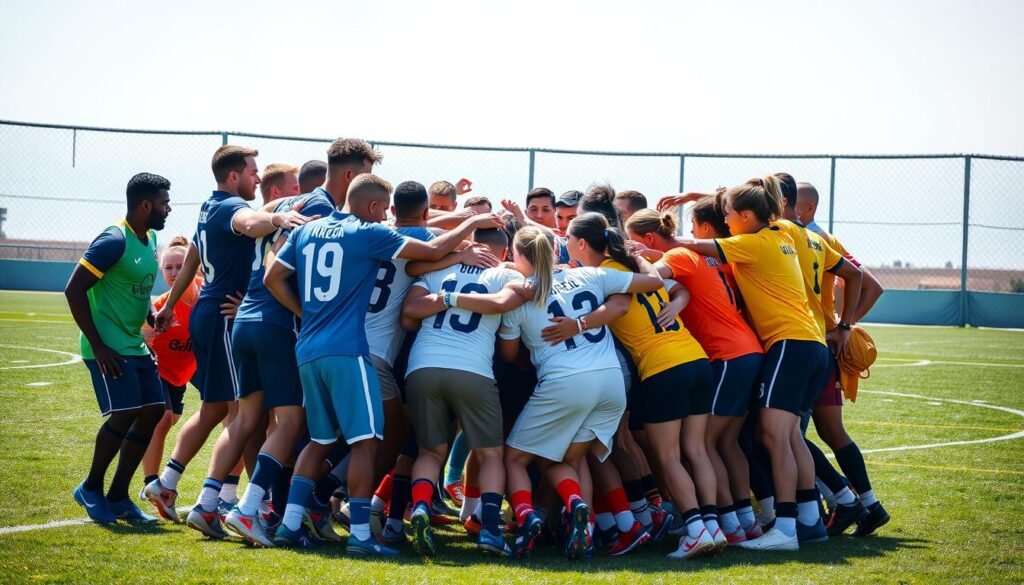The power of sports psychology became clear to me during one crucial coaching session with a client of mine. After only two coaching sessions, this athlete transformed from a nervous wreck during game point to a confident winner. This showed me the mind’s vital role in sports performance and how fast this transformation can happen with the right mindset training.
I’ve worked with various athletes, from youngsters to Olympians. Each taught me about mental strength in sports. Their stories of overcoming self-doubt have been truly inspiring.
Setting high yet realistic goals is a key sports psychology tip. It helps athletes push boundaries while staying motivated. At the Ohio Center for Sport Psychology, we focus on nine mental skills.
These skills are crucial for success in sports. They form the basis of our athlete mindset strategies. The Performance Pyramid has revolutionized my approach to mental training.
It shows how mental skills affect long-term growth and immediate performance. This framework helps athletes balance mental and physical training. Many athletes have benefited from this structured approach.
Key Takeaways
- Mental training is as crucial as physical training for athletes
- Setting high, realistic goals is essential for athletic success
- Nine specific mental skills contribute to sports performance
- The Performance Pyramid guides mental skill development
- Confidence and positive thinking significantly impact performance
- Mental toughness helps athletes push their limits
- Simplifying focus through cue words can enhance performance
Sports Psychology Tips for Athletes
Sports psychology has evolved since Coleman Griffith’s pioneering work in 1925. It’s now vital for athletic training. Understanding mental training basics is key for athletes aiming to boost their performance.
Understanding Mental Training Fundamentals
Mental toughness in sports goes beyond pain endurance. It’s about performing your best under pressure. Key techniques include positive self-talk, visualization, and goal setting.
Building Mental Strength Through Practice
Mental strength, like physical skills, needs regular practice. Try adding sports psychology exercises to your daily routine. These can include meditation, breathing exercises, or mental rehearsal.
Integration with Physical Training
Combining mental and physical training is most effective. Focus on your mindset during workouts. Use positive affirmations while lifting weights or visualize during cardio sessions.
| Year | Milestone in Sports Psychology |
|---|---|
| 1925 | Coleman Griffith pioneers sports psychology |
| 1960s | Sport psychology classes begin in U.S. universities |
| 1965 | First ISSP conference in Rome |
| 1979 | Journal of Sports Psychology established |
| 1984 | Oakland Athletics hire first mental training consultant |
Mental training is crucial for athletic success. By using performance psychology techniques, you’ll develop the mental toughness that sets champions apart. Incorporate these methods into your routine for optimal results.
The Power of Positive Mindset in Athletics
A positive sports mindset can transform an athlete’s performance. It leads to remarkable achievements and unlocks potential. Let’s explore how to build this powerful mindset.
Developing Self-Belief
Self-belief forms the bedrock of athletic success. Athletes should focus on their strengths and past wins. This practice boosts confidence and drives self-motivation.
Believing in yourself is key to reaching your goals. It fuels determination and helps overcome obstacles.
Overcoming Negative Thoughts
Negative thoughts can hinder performance. Athletes learn to turn negative self-talk into positive affirmations. This shift is crucial for keeping a winning attitude.
Positive thinking helps athletes push through tough times. It builds mental toughness and resilience.

Creating Positive Training Environments
Your training environment shapes your mindset. Surround yourself with supportive teammates and coaches. A positive atmosphere fosters growth and boosts overall performance.
| Benefits of Positive Thinking | Impact on Athletes |
|---|---|
| Increased Confidence | Higher risk-taking, goal achievement |
| Enhanced Motivation | Greater dedication to training |
| Improved Focus | Better concentration during competitions |
| Greater Resilience | Faster recovery from setbacks |
| Better Team Dynamics | Increased support among teammates |
A positive mindset goes beyond just happy thoughts. It’s about building resilience, focus, and motivation in your sport.
Develop self-belief, tackle negative thoughts, and create positive environments. These steps set you up for success in sports and life.
Mental Toughness Development Strategies
Mental toughness training can transform an athlete’s performance. The Oklahoma University gymnastics team is a prime example. They won three straight National Championships by building mental resilience.
Their method? They practiced in tough situations. People would yell during routines and directions would change without warning. This helped build mental clarity under pressure.
Here are key strategies I suggest:
- Set clear goals and learn from setbacks
- Face your fear of failure head-on
- Identify weak spots and work on them
- Set a mental toughness goal for each practice
Consistency is key in mental toughness training. You need to work on it every day. It’s not about occasional efforts.
Studies support this idea. Mental toughness is linked to lower stress and better sleep. It also reduces depression incidents.
You can learn and improve this skill over time. It’s a valuable asset for athletes.
| Past View (50 years ago) | Current View |
|---|---|
| Mind had some impact on performance | Mind significantly impacts performance |
| Mental barriers rarely considered | Mental barriers recognized as common |
| Stress viewed as weakness | Stress acknowledged as normal |
Failure is a normal part of sports. It’s your chance to build resilience. Focus on mental toughness training for long-term success.
Performance Anxiety Management Techniques
Sports anxiety is a common challenge for athletes. Effective ways exist to handle competition nerves and achieve peak performance. Let’s explore powerful techniques for stress control in athletes.
Pre-Competition Anxiety Control
Developing a solid pre-competition routine is crucial. This includes visualization and mental rehearsal. Picturing success calms nerves and boosts confidence.
Setting realistic goals using the SMART framework helps maintain focus. It also reduces anxiety and prepares you mentally for the challenge ahead.

Breathing Exercises for Stress Relief
Deep breathing is a quick technique for managing anxiety. When your heart races before an event, take slow, deep breaths. This simple act lowers heart rate and eases muscle tension.
Converting Nervousness into Excitement
Reframe anxiety as excitement to improve performance. Instead of thinking, “I’m nervous,” tell yourself, “I’m excited for this challenge.” This mindset shift channels energy into better performance.
Positive self-talk is a powerful tool in handling competition nerves. It helps build confidence and maintain focus during high-pressure situations.
Some anxiety is normal and can enhance performance. The key is learning to manage it effectively. These techniques can improve your ability to control stress and perform well.
Visualization and Mental Rehearsal
Visualization techniques are game-changers for athletes. Elite performers use guided imagery to boost their performance. Many Olympians master this skill through work with sport psychologists.
Michael Phelps watches a “mental videotape” of his races daily. This practice primes his brain for success. Mental rehearsal strategies stimulate the same brain regions as physical action.
This conditioning helps eliminate unknowns that often create competitive anxiety. Visualization improves with repetition, becoming a powerful tool. It helps build strengths and address weaknesses.
Athlete goal visualization involves all senses:
- Visual: Picturing perfect form
- Auditory: Hearing the crowd’s cheers
- Kinesthetic: Feeling the movement
- Olfactory: Smelling the environment
- Touch: Sensing equipment textures
For best results, make visualizations vivid, detailed, and in real-time. This approach helps maintain confidence, focus, and mental toughness during competitions. It’s also valuable during injury recovery, aiding skill maintenance.
Quality trumps quantity in visualization practice. Tailor your mental imagery to your current needs. Focus on perfecting skills or managing competition nerves.
Consistent practice unlocks the full potential of this mental training tool. It’s a powerful way to enhance your athletic performance.
Goal Setting for Peak Performance
Goal-setting helps athletes reach their best performance. It can change an athlete’s mindset and drive them to succeed. Let’s explore strategies that can boost your game.
Short-term vs Long-term Goals
Athletes should balance short-term and long-term goals. Short-term goals keep you motivated daily. Long-term goals provide direction for your career.
A swimmer might aim to improve their turn technique in each practice. This short-term goal supports their long-term goal of breaking a personal record.
SMART Goal Framework
The SMART framework is crucial in sports psychology. It makes goals Specific, Measurable, Achievable, Relevant, and Time-bound. Here’s how it works:
- Specific: “Improve my 400m sprint time” instead of “Run faster”
- Measurable: “Reduce my time by 0.5 seconds”
- Achievable: Set realistic targets based on your current performance
- Relevant: Align with your overall athletic aspirations
- Time-bound: “Achieve this by the end of the season”
Progress Tracking Methods
Tracking progress is key for maintaining peak performance. Use a performance journal to log your daily efforts and achievements. Rate your performance from 1-10 based on effort, not just outcomes.
This approach helps focus on the process, a key aspect of sports psychology tips.

| Goal Type | Example | Benefit |
|---|---|---|
| Short-term | Improve start technique in next practice | Immediate focus and motivation |
| Long-term | Break school record in 400m sprint | Provides direction and purpose |
| Process | Perfect arm swing in sprinting | Enhances technique and performance |
Effective goal-setting is an ongoing process. Review and adjust your goals regularly. This will help you keep pushing towards your peak performance.
Building Athletic Confidence
Confidence is a game-changer in sports. It’s not just nice to have; it’s essential. Without it, gameplay turns timid and self-doubt creeps in.
Strong self-belief helps athletes approach competitions ready to shine. It’s a key factor in achieving peak performance.
Self-Talk Strategies
Positive self-talk is a powerful confidence-building exercise. It helps reframe negative thoughts into motivating ones. It’s like having a personal cheerleader in your head.
Performance Affirmations
Positive affirmations are crucial for boosting self-belief in athletes. Use personalized statements that resonate with your goals and strengths. Examples include “I am strong, skilled, and ready to excel” or “Every challenge is an opportunity.”
Success Visualization
Visualization is a secret weapon for building athletic confidence. Spend time each day imagining successful performances in vivid detail. Picture yourself executing perfect moves and feeling the rush of achievement.
This mental rehearsal primes you for real-world success. It helps create a positive mindset for competitions.
| Confidence Source | World-Class Athletes | Young Elite Athletes |
|---|---|---|
| Achievement | High confidence | Fluctuating confidence |
| Skill Execution | Very confident | Confident |
| Physical Factors | High confidence | Confident |
| Psychological Factors | Strong confidence | Some confidence |
| Superiority to Opponents | Confident | Not confident |
Confidence is a skill that grows with practice. Consistently applying these strategies can lead to remarkable improvements in performance. It’s an ongoing journey that’s worth the effort for any athlete.
Focus and Concentration Enhancement
Enhancing focus is vital for athletic success. Top athletes use diverse strategies to stay sharp during competitions. LSU’s Sierra Ballard’s 9.95 score at the 2024 NCAA Women’s Gymnastics Championships shows true concentration’s power.
Daily visualization is a powerful sports concentration technique. It helps develop a competitive focus faster. Performance cues, like personalized phrases or mental images, can significantly improve focus during events.
These cues act as triggers, instantly sharpening your mind when needed most. Mental focus drills are key for building lasting concentration skills.

Deep breathing exercises manage stress and boost focus. This is one of the most underrated ways to manage stress under pressure, and one of the secrets that have helped me win 10 Islands Championships and reach the pinnacle of table tennis in the UK.
Include breathing exercises in your training routine, so when the pressure is on you’re prepared and know how to use breathing to your advantage. Practice staying present and task-oriented during sessions. This builds the mental stamina needed for competition day.
Track progress by rating your focus after each practice or competition. This self-evaluation helps identify areas for improvement. Athletes who stay relaxed under pressure often show better focus and performance.
| Focus Strategy | Benefit | Implementation |
|---|---|---|
| Daily Visualization | Faster development of competitive focus | Set aside 10 minutes daily for mental rehearsal |
| Performance Cues | Improved focus during competitions | Develop personalized phrases or gestures |
| Deep Breathing | Stress management and concentration | Practice before and during events |
| Present-Moment Focus | Enhanced task orientation | Incorporate mindfulness in training |
Emotional Control in Competition
Emotional control is vital for athletes to succeed in sports. Managing emotions can greatly impact performance. Let’s explore strategies for handling pressure and staying composed during crucial moments.
Managing Competition Stress
Competition stress can be overwhelming. Preparation is key to managing it effectively. I practice deep breathing exercises before big events to calm my nerves.
Positive self-talk helps me stay focused and confident. Reminding myself of my strengths keeps stress at bay.
Maintaining Composure Under Pressure
Staying calm under pressure is a skill I’ve developed. I simulate high-stress situations during practice to build mental toughness. This approach has improved my reactions in real competitions.
When faced with challenges, I focus on what I can control. This includes my effort and attitude.

Recovery from Setbacks
Setbacks are part of sports, but mental recovery is essential. I’ve learned to view mistakes as learning opportunities. Quick refocusing techniques help me bounce back faster.
Taking a deep breath and visualizing success are effective methods. Accepting emotions as natural allows me to use them constructively.
| Emotion Management Technique | Benefit | Usage % |
|---|---|---|
| Positive Self-Talk | Stress Reduction | 76% |
| Mindfulness Practices | Enhanced Emotional Control | 65% |
| Visualization | Improved Confidence | 82% |
| Music | Increased Motivation | 90% |
Using these strategies has improved my emotional control during competitions. Mastering emotions is an ongoing process. It can lead to peak performance and personal growth in athletics.
Team Dynamics and Communication
Team dynamics are vital for sports success. The Chicago Cubs’ 2016 World Series win showcases the power of team cohesion. As a coach, I’ve witnessed how communication skills impact team performance.
Sports psychology stresses creating a supportive environment. I promote open communication among athletes. This builds trust and respect, improving team dynamics.

Effective communication solves problems and makes decisions efficiently. I use exercises like “Sugar and Salt” to set clear expectations. These prepare athletes for tough conversations and challenging situations during competitions.
I focus on communal support to boost team cohesion. This strategy has improved overall performance. I guide teams through development stages to achieve unity.
| Communication Skill | Impact on Team Dynamics |
|---|---|
| Active Listening | Improves understanding and reduces conflicts |
| Constructive Feedback | Enhances performance and builds trust |
| Non-verbal Cues | Strengthens team cohesion and rapport |
Focusing on these skills has led to remarkable team improvements. Teams that communicate well are more likely to succeed. This applies both on and off the field.
Pre-Performance Routines and Rituals
Pre-game mental prep can make or break an athlete’s performance. Athlete routines are crucial for success in competitions. Let’s explore how to create powerful mental warm-ups for sports.
Developing Personal Routines
Personal routines are vital for consistent performance. Athletes should identify key elements for mental and physical preparation. This may include warm-ups, visualization, or mental focus cues.
The aim is to create a routine that feels natural and boosts confidence. Regular practice helps make these rituals second nature.
Competition Day Preparation
On competition day, your routine becomes your anchor. A mix of physical and mental prep works best. Start with dynamic warm-ups to ready your body.
Then, move to mental exercises. Visualization is powerful – imagine yourself performing at your peak. This mental rehearsal can improve focus and reduce anxiety.
Mental Warm-up Techniques
Effective mental warm-ups are crucial for peak performance. Begin with deep breathing to calm your nerves. Follow with positive self-talk to boost confidence.
Remember, your mind is your most powerful tool on competition day. These techniques help you enter your optimal performance state.
| Technique | Benefit | Success Rate |
|---|---|---|
| Visualization | Improves focus and confidence | 70% of pro athletes use it |
| Pre-performance Routines | Reduces anxiety | 15% reduction in perceived anxiety |
| Mental Rehearsal | Enhances psychological readiness | 30% increase in mental resilience |
Consistency is key in mastering pre-performance routines. Practice regularly and adjust based on your experiences. Over time, these rituals will help you perform at your best.
Conclusion
Sports psychology offers numerous benefits for athletes. Mental training is crucial in today’s competitive world. These tools can build confidence and manage stress effectively.
Athlete performance isn’t just about physical skills. It’s about harnessing mental power too. Visualization, goal-setting, and positive self-talk can significantly improve performance.
Studies show these methods help athletes handle pressure better. They can boost performance in challenging situations.
Sports psychology isn’t just for elite athletes. Anyone can use these skills to enhance their game. Mental training can help with performance anxiety and focus.
Integrating these practices into your routine can lead to success. You’ll see improvements both on and off the field.



